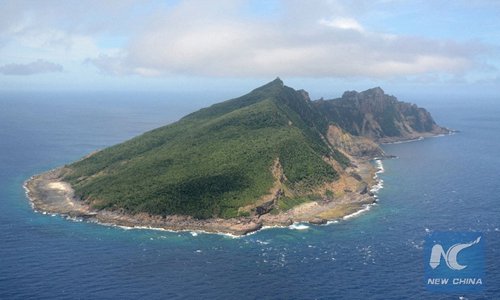
#DiaoyuIslands in the E China Sea and its affiliated islands
China and Japan recently confirmed the importance of downgrading tension in the East China sea, following a new dispute over the Diaoyu Islands and Japanese media's hype over "the threat of China," which might indicate Japan's hidden motive, according to experts.
China and Japan on Wednesday exchanged ideas at a virtual conference on maritime security. According to the Japanese media, Takehiro Funakoshi, director general of the Japanese Foreign Ministry's Asian and Oceanian Affairs Bureau, protested against Chinese ships' activity around the Diaoyu Islands, over which China and Japan have disputes.
China reiterated its principle on the Diaoyu Islands issue, saying it hopes to manage differences through dialogue and communication, and to safeguard stability in the East China Sea. Both countries stressed the need to strengthen communication through bilateral channels and promote practical maritime cooperation.
The Japanese media, however, took a tough stance by claiming the Diaoyu Islands as Japan's territory, and describing the normal navigation of Chinese boats as "extremely serious."
Analysts suggest that agitation in the Japanese media on the Diaoyu Islands is not only to exert psychological pressure on China but also to remind the Biden administration to continue the Trump administration's Indo-Pacific strategy.
Liu Jiangyong, vice dean of the Institute of Modern International Relations at Tsinghua University, told the Global Times that Japan wants the Biden administration to continue Trump's policy in the Indo-Pacific and to affirm that the Diaoyu Islands are covered by article 5 of the Treaty of Mutual Cooperation and Security between the US and Japan.
Besides the US-Japan alliance, the US-Australia-India-Japan alliance, known as "The Quad," has also formed. Japanese media reports said that the UK and France will also take part in a joint military exercise in waters near China in 2021.
"Japan is trying to establish a multilateral mechanism to restrict China's air and naval power through the US-Japan alliance. The Japanese media's hype on the Diaoyu Islands dispute aims to prepare public opinion for their actions. Japan wants to create the impression that China is using its strength to undermine the status quo and that Japan is an 'innocent victim,'" Liu said.
Analysts said that the Diaoyu Islands are an inherent territory of China, in terms of international law and historical records. But Japan has thrown false evidence to mislead the public that the islands belong to Japan, and has not agreed to engage in sincere dialogue with China.
In the face of longstanding missteps by Japan, the Standing Committee of China's National People's Congress is meeting from Wednesday to Friday to review a draft law that would authorize China's coastguard to use weapons when handling illegal activities by foreign ships in China-claimed waters.
China's moves are aimed at preventing crises and managing risks, said Liu. "Both the Japan Coast Guard and their Chinese counterparts are professional; they are not playing the role of troublemakers and must avoid escalation."
In a tour to Japan in late November, Chinese State Councilor and Foreign Minister Wang Yi suggested that if China and Japan do not allow non-government vessels to enter the surrounding waters, the Diaoyu Islands dispute will subside. However, Japanese Chief Cabinet Secretary Katsunobu Kato said the plan is unacceptable.
"China has done its utmost in all sincerity. Once the coastguard legislation is passed, China's coastguard will step up its enforcement efforts. If Japanese vessels insist on entering Diaoyu Islands waters, they will be looking for trouble," Liu said.
Japan has repeatedly dispatched so-called fishing boats that are actually intelligence vessels to test China's bottom line, carrying out reconnaissance missions including recording the behavior and trajectory of Chinese government ships, Liu said.

